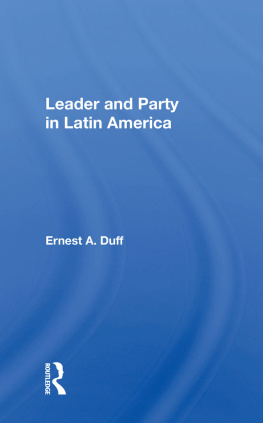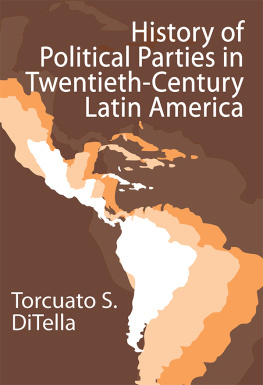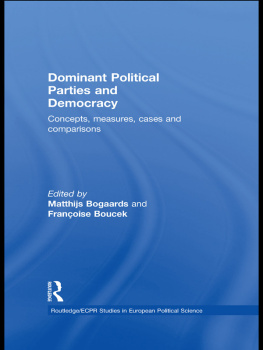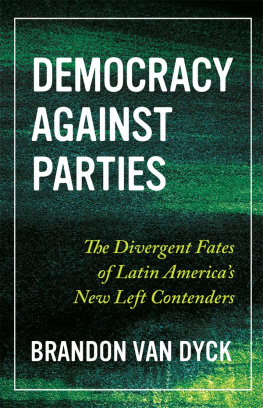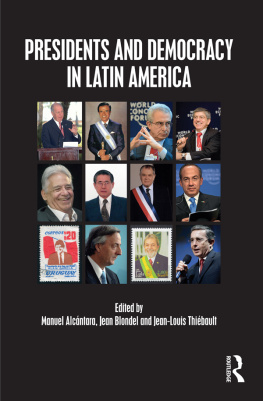Leader and Party in Latin America
Westview Special Studies
The concept of Westview Special Studies is a response to the continuing crisis in academic and informational publishing. Library budgets for books have been severely curtailed. Ever larger portions of general library budgets are being diverted from the purchase of books and used for data banks, computers, micromedia, and other methods of information retrieval. Interlibrary loan structures further reduce the edition sizes required to satisfy the needs of the scholarly community. Economic pressures on the university presses and the few private scholarly publishing companies have severely limited the capacity of the industry to properly serve the academic and research communities. As a result, many manuscripts dealing with important subjects, often representing the highest level of scholarship, are no longer economically viable publishing projects--or, if accepted for publication, are typically subject to lead times ranging from one to three years.
Westview Special Studies are our practical solution to the problem. We accept a manuscript in camera-ready form, typed according to our specifications, and move it immediately into the production process. As always, the selection criteria include the importance of the subject, the work's contribution to scholarship, and its insight, originality of thought, and excellence of exposition. The responsibility for editing and proofreading lies with the author or sponsoring institution. We prepare chapter headings and display pages, file for copyright, and obtain Library of Congress Cataloging in Publication Data. A detailed manual contains simple instructions for preparing the final typescript, and our editorial staff is always available to answer questions.
The end result is a book printed on acid-free paper and bound in sturdy library-quality soft covers. We manufacture these books ourselves using equipment that does not require a lengthy make-ready process and that allows us to publish first editions of 300 to 1000 copies and to reprint even smaller quantities as needed. Thus, we can produce Special Studies quickly and can keep even very specialized books in print as long as there is a demand for them.
About the Book and Author
Tracing the development and decay of political parties in Latin America, Dr. Duff suggests that the sociological or environmental explanations of political parties are inadequate in explaining why institutionalized political parties develop in some societies and not in others. In a series of eight case studies of disparate Latin American nations in the 1920s and 1930s, Dr. Duff shows that the crucial factor in party institutionalism appears to be the emergence of political leaders who must rely on manipulation of institutions they create, rather than on personal charisma, for ultimate control of the political process. The successful institution builders-- Calles in Mexico, Trujillo in the Dominican Republic, and Betancourt in Venezuela--are contrasted with notable failures--Yrigoyen in Argentina, Arturo Alessandri in Chile, Grau San Martin in Cuba, General Martinez in El Salvador, and Haya de la Torre in Peru.
Ernest A. Duff is chairman of the Department of Politics at Randolph-Macon Woman's College in Lynchburg, Virginia. He is the author of Agrarian Reform in Colombia and coauthor (with John F. McCamant) of Violence and Repression in Latin America.
Leader and Party in Latin America
Ernest A. Duff
This book is dedicated to the memory of C. Alan Hutchinson.
First published 1985 by Westview Press, Inc.
Published 2018 by Routledge
52 Vanderbilt Avenue, New York, NY 10017
2 Park Square, Milton Park, Abingdon, Oxon OX14 4RN
Routledge is an imprint of the Taylor & Francis Group, an informa business
Copyright 1985 Taylor & Francis
All rights reserved. No part of this book may be reprinted or reproduced or utilised in any form or by any electronic, mechanical, or other means, now known or hereafter invented, including photocopying and recording, or in any information storage or retrieval system, without permission in writing from the publishers.
Notice:
Product or corporate names may be trademarks or registered trademarks, and are used only for identification and explanation without intent to infringe.
Library of Congress Cataloging in Publication Data
Duff, Ernest A.
Leader and party in Latin America.
(A Westview special study on Latin America and the Caribbean)
Bibliography: p.
Includes index.
1. Political parties--Latin America. 2. Political leadership--Latin America. I. Title.
JL969.A45D84 1985 324.2'2'098 84-25711
ISBN 13: 978-0-367-00817-8 (hbk)
Contents
- Part 1
Introduction - Part 2
The Successful Institution Builders - Part 3
The Failures
The author accepts full responsibility for the content of this book, but nevertheless wishes to recognize the important contributions made by others.
Three of my colleagues, Susan Lockhart, Charlotte Stern, and Philip Thayer, read all or part of the manuscript. I am sure that their suggestions have vastly improved the final product.
My wife, Barbara, served as both editor and typist, especially in the early stages of this work. Ruth Bryan did the word processing on the final draft and helped me meet my deadlines.
Ernest A. Duff
Part 1
Introduction
Our images of Latin America in the 1920s and 1930s are vague and contradictory. On the one hand there is the caudillo , that comic-opera bemedalled general immortalized in H. L. Mencken's famous essay, "Gore in the Caribee." The other image is of inept and perhaps venal politicians, being seduced by rapacious Northernerican bankers, as presented in J. Fred Rippy's The Capitalists and Colombia . Yet, the two decades preceding World War II were of immense importance to an adequate understanding of Latin America of today? for it was during this period that political institutions were either created or destroyed, with the resultant political stability or chaos we observe today.
This is a study of the political leaders who produced those different types of political institutions, and how these institutions either have worked for or against the development of cohesive societies. Futher, it is a study of the relationship between the largely unexplored variable of political leadership and the environmental variables which have received most of the attention in writings on political parties' origins and development. More specifically, this study is an inquiry into the relation between political leadership and the development of modern political parties, and of the effect these parties have had upon the political life of various nations. Latin America is the locale for this book primarily because it presents such divergent cases of political leadership and subsequent political history. A major theme of this book is that certain political leaders in certain countries created and/or developed political parties capable of at least partially resolving the subsequent political crises through which these nations have passed, with a minimum of governmental repression or anti-systemic violence. Implicit in this theme is the idea that political development is not something that results from short-run forces within or without the polity; rather, the development of a cohesive society is a process that

